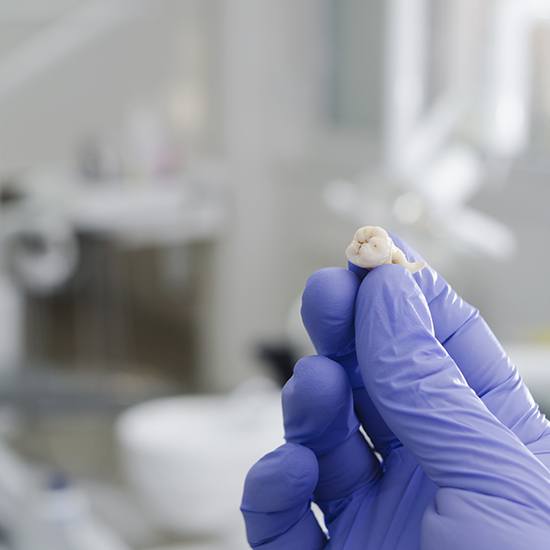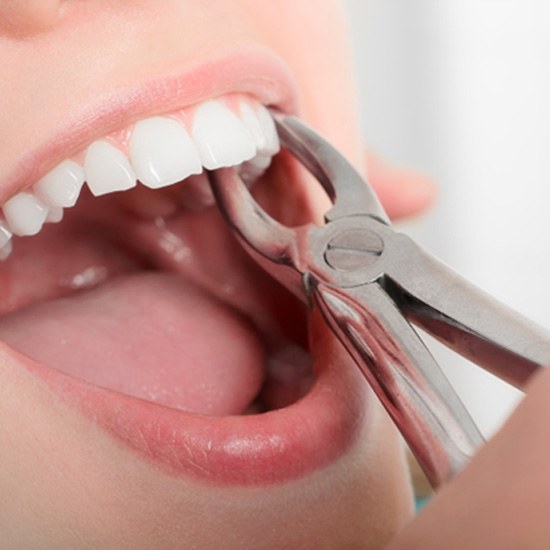Tooth Extractions – Arvada, CO
When Problem Teeth
Have to Go
We’ll always prioritize saving your damaged teeth whenever possible, but there are times when a tooth extraction will be the only option available. Dr. Paylor and the rest of our team will help make the entire process as comfortable as we can, so you don’t have to worry during tooth extractions in our Arvada, CO dental office. Call us immediately if you’re suffering from a broken or aching tooth.
Why Choose West Arvada Family Dental for Tooth Extractions?
-
Patients of All Ages
are Welcome -
Various Tooth
Replacement Options -
Caring Dentist with
a Gentle Touch
Reasons Why Tooth Extractions are Necessary

A tooth extraction is a serious procedure, one that’s performed only in grave situations. After all, your natural teeth are your best tools for biting, chewing, and smiling! Therefore, our office will usually suggest restorative work like root canal therapy or a dental crown instead.
Even so, an extraction is sometimes needed to preserve your oral health. Consequently, our team may suggest one if you suffer from any of the following:
- Severe Tooth Damage or Decay
- Tooth Impaction
- A Growing Tooth Infection
- Dental Overcrowding
- A Stuck or Wedged “Baby” Tooth
The Process of Removing a Tooth

Based on the initial consult, our office will assess how (and whether) to extract your tooth. Should we proceed, we’ll perform either a simple or surgical extraction.
A simple extraction takes place if the tooth is visible. Once the problem area is numbed, this method removes your tooth with special forceps. In particular, Dr. Paylor will use that tool to rock your chomper back and forth until it separates from your gums.
In contrast, surgical extraction is ideal when a tooth hasn’t fully erupted. For such a pearly white, Dr. Paylor will make an incision in the gums to gain better access. Then, he divides and removes the tooth in sections to minimize bone loss. Finally, he’ll conclude the extraction by sewing up the incision.
Regardless of type, a dentist often follows up extraction with a tooth replacement. This action ensures you don’t suffer the long-term effects of tooth loss.
Tooth Extraction Aftercare

Naturally, recovering from extraction takes time. The treatment site will be sensitive at first from having a tooth removed. To enhance your recovery, then, our team will provide you with post-op instructions. Some of these guidelines include:
- After the first 24 hours, clean the extraction site with a saltwater rinse
- Avoid smoking and spitting to speed up the healing process
- Use over-the-counter pain relievers to manage discomfort
- Don’t drink from a straw, as the suction can dislodge your blood clot
- Try not to chew near the extraction site
These and similar tips will help your mouth recover effectively. Once it has, seriously consider replacing the missing tooth (or teeth). By doing so, you’ll restore your smile, strengthen your bite force, and more!
Understanding the Cost of Tooth Extractions

People who need tooth extractions are often nervous about the procedure, and even more so about paying for them. We will do everything that we can to make the treatment stress-free for you, which means making payment easy.
If you have any questions about how you can budget for your dental care, we’ll be happy to answer them in great detail when we meet you in person. Until then, here’s what you should know about the cost of a tooth extraction.
Factors That Can Affect Tooth Extraction Cost

Part of the reason why it isn’t necessarily possible to tell you what your tooth extraction is going to cost without meeting you first is that there are several factors that could influence the cost of your treatment in one way or another. For example:
- The number of teeth that are being removed
- The type and location of the tooth in the mouth
- Whether the tooth is broken, impacted, or if the extraction is unusually complex for some other reason.
- In some cases, an external specialist may need to be brought in to handle the extraction. They will have their own rates that they charge for dental care.
- What you’ll use to replace your tooth, whether it’s a bridge, implant, or denture.
Does Dental Insurance Cover Tooth Extractions?

Tooth extractions are typically only done when medically necessary, which is why dental insurance will usually cover a portion of your services. Depending on the nature of your dental plan, you may be able to have 50% of the cost of your extraction covered. Of course, the details of your insurance matter a lot here, so you should be sure to reach out to them before pursuing dental care.
Other Options for Making Tooth Extractions Affordable

We also know that not everyone has insurance. That’s why we endeavor to make it easy for our patients to pay for their services from us even if they’re uninsured.
If you’re not excited about the prospect of paying for your care all at once, you may be interested in talking to us about financing services. We often work with CareCredit, a firm that offers low-to-no interest terms to patients who qualify.
If you want to know about how you can make your dental care fit your budget, give us a call and we’ll be happy to talk to you about the methods available to you.
Tooth Extractions FAQs
Does Getting a Tooth Extracted Hurt?
When it comes to any type of restorative dental care – from fillings to tooth extractions – many patients are concerned that the procedure will come with some discomfort. The reason that’s not the case is that the first step is always the same: numb the area of your mouth that we’ll be working on. Plus, we can add sedation dentistry to your treatment plan if you experience dental-related anxiety, you struggle with a sensitive gag reflex, or you need multiple teeth extracted.
What Are My Options for Replacing a Missing Tooth?
If you had one or more teeth removed because of extensive decay or damage, then part of the treatment process will be determining which tooth-replacement option is best for you. Dentures are a tried-and-true solution that has been used for decades, and they can effectively restore an entire arch of missing teeth. Dental bridges are also a popular option because they are custom-made for each patient, and they can replace one missing tooth or several missing teeth in a row. The last option is dental implants, which are unique in that they replace both the root and crown of the missing tooth and can last for three decades with proper care.
As you can see, there are pros of each, which is one of the many reasons your initial consultation is so important. At this time, we will conduct a comprehensive oral exam and learn more about your dental history so we have a complete picture of your dental needs.
Can I Leave the Space Empty After a Tooth Extraction?
Most of the time, the answer is “no.” After all, even if you can’t see the tooth when you smile, it serves an important role when it comes to maintaining a healthy, functional smile. That said, there are some exceptions. If, for example, your tooth was removed due to overcrowding, then it wouldn’t make sense to replace it with something else.
Can I Smoke After Getting a Tooth Extracted?
Smoking doesn’t just wreak havoc on your teeth and gums; it also can increase your risk of complications following a tooth extraction. For that reason, patients are encouraged to quit this habit altogether. At the very minimum, tobacco products need to be avoided for five days prior to the procedure and two weeks afterward.
How Should I Prepare for My Tooth Extraction?
Tooth extractions are common, but they are still a major procedure. For that reason, we recommend doing what you can to make both the procedure and recovery smooth ahead of time. That includes arranging for a trusted adult to drive you home from your appointment, making sure you have OTC pain medication, and stocking your pantry and fridge with soft foods and snacks. It’s also smart to double-check with your dental team if you need to fast prior to your procedure.

